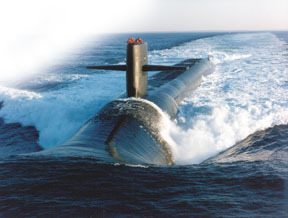A new House commission plans to study ways of nhancing Rhode Island’s $1.6-billion defense industry
Defense giant Raytheon has secured a $15.3-million contract from the U.S. Navy to develop ship defense systems to detect and engage in a missile attack.
Nearly 50 percent of the work will be done in the Ocean State at the company’s Portsmouth facility.
Contracts, such as Raytheon’s latest one, are examples of why legislators and business leaders are pooling their efforts to build on the state’s thriving defense industry.
The Rhode Island House of Representatives has formed a 17-member commission to study the defense industry and to propose initiatives to sustain and enhance the state’s business of defense.
House Majority Leader Gordon Fox, a Providence Democrat, said he introduced the bill to form the commission in order to educate legislators and the public about the amount of defense business that comes in and out of the state.
“I didn’t think that there was enough knowledge at the State House … on how we can expand the defense industry here,” Fox said.
Fox added that he too was unaware of the thriving defense economy in Rhode Island, adding that he was shocked at the number of businesses providing products and services to the Department of Defense and to the defense industry as a whole.
“The defense industry is a broad category because there are substantial businesses providing technology support,” he said.
The defense industry in the state has an economic impact of $1.6 billion and employs more than 15,000 people in the state, according to the Southeastern New England Defense Industry Alliance (SENEDIA).
On Aquidneck Island alone, there are 11,000 people employed by the defense industry with a payroll of more than $870 million.
Defense giants such as Electric Boat, Raytheon and the Naval Undersea Warfare Center (NUWC), some of the state’s biggest employers, receive dozens to hundreds of defense-related contracts each year.
In addition to the Raytheon contract made public last week, Electric Boat recently received a $24-million contract from the Department of the Navy to continue the conversion of Trident ballistic-missile submarines into submarines equipped to fire Tomahawk missiles.
And Aquidneck Management Associates, based in Middletown, was awarded $14 million for work on the Submarine-Launched Missiles program. Aquidneck will provide the logistical support for the program at the NUWC.
Although the NUWC, Electric Boat and Raytheon are the giants, Fox said the commission would also be sure that there are support networks in place for smaller companies.
Keith Stokes, a member of the commission and executive director of the Newport County Chamber of Commerce, said the group needs to put a strategy in place to work with existing Rhode Island businesses – especially the Raytheons of the world because of what those businesses bring to the economy. Small businesses, he added, will benefit from the larger companies’ success.
“NUWC, as an example, each year puts out 1,500 small-business contracts in Rhode Island, Massachusetts and Connecticut,” Stokes said. “Raytheon and EB both have about 100 (New England)-based subcontractors. I would say, by ensuring that EB, NUWC and Raytheon are strong and vibrant, it will be a direct benefit (to others).”
Banneker Industries Inc., a supply chain management business in Lincoln, is one of those companies that is benefiting from the larger contractors.
Last month, Banneker signed a Mentor-Protégé agreement with the Department of Defense to bid for contracts with Raytheon. Banneker also received a $3-million contract with the John A. Volpe National Transportation Systems Center, a federal organization in Cambridge, Mass. Banneker will provide Volpe with logistics services including transportation, warehousing and administrative services.
Another major initiative on the commission’s agenda is looking into the defense department’s threat of shutting down several naval bases throughout the country.
The U.S. Congress and the defense department have formed a Base Realignment Closure Commission, or BRAC, to examine all of the nation’s military bases. The group will decide which facilities should be closed and which should remain operational. A new round of closings is expected to take place in 2005.
“It’s a process that the defense department is working on to reduce infrastructure,” said Capt. Robert Mushen, president of SENEDIA and member of the new commission.
While those in the industry continue to increase business in defense, officials say they’ll be examining the strengths and weaknesses of the defense economy. One weakness, according to Stokes, is the cost of doing business in New England.
“The cost of electricity, for example, is an issue that needs to be looked at very carefully,” he said.
Marine-related issues, including regulatory issues, will also be reviewed in order to help the state’s defense industry prosper.
For the complete current issue, visit our subscription Web site, or call (401) 273-2201, ext. 227 or 234.













